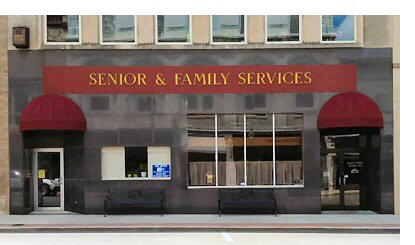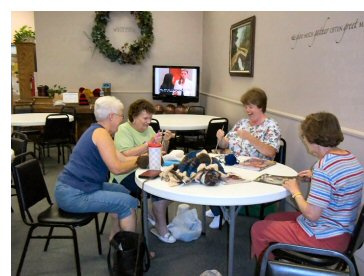Community Senior Centers
 Community Senior Centers are located in Washington, Odon, Petersburg and Winslow. Open to the community with a focus on senior citizens, these centers provide an opportunity for the community to get involved in a variety of activities including cards, music, bingo, Bible study, crafts, inter-generational activities, celebrations, biscuit and gravy breakfasts,
Community Senior Centers are located in Washington, Odon, Petersburg and Winslow. Open to the community with a focus on senior citizens, these centers provide an opportunity for the community to get involved in a variety of activities including cards, music, bingo, Bible study, crafts, inter-generational activities, celebrations, biscuit and gravy breakfasts,  guest speakers, computer lab, wii (bowling, baseball, sports), crochet/knitting club and MORE! Lunch is available M-W-F. Most activities are available at no charge, however, some may require a minimum fee. Donations are always appreciated!
guest speakers, computer lab, wii (bowling, baseball, sports), crochet/knitting club and MORE! Lunch is available M-W-F. Most activities are available at no charge, however, some may require a minimum fee. Donations are always appreciated!
Community Senior Center Locations and Phone Numbers:
Additional Information
Importance of Fun Activities
“Men do not quit playing because they grow old; they grow old because they quit playing.”
― Oliver Wendell Holmes Jr.
Perhaps you have heard the saying, ‘All work and no play makes Jack a dull boy.’ There is probably more truth to the saying than most realize. Research indicates that without play it is hard to give your best at work or at home.
What do you do on a regular basis for fun? When was the last time you went down a slide, played hide and go seek or a good game of wiffle ball? Many adults have the mindset that they are too old to play. There is actually strong evidence that this could not be further from the truth. Play may be the very thing that keeps you young and healthier. In fact, studies show that a life lived without play is at increased risk for stress related diseases, mental health issues, addiction and interpersonal violence.
According to the National Institute, play is the gateway to vitality. By its nature it is uniquely and intrinsically rewarding. It generates optimism, seeks out novelty, makes perseverance fun, leads to mastery, gives the immune system a bounce, fosters empathy and promotes a sense of belonging and community. Each of these play by-products are indices of personal health, and their shortage predicts impending health problems and personal fragility.
Play also enhances relationships. The National Institute for Play cites studies that indicate that play refreshes a long-term adult-adult relationship. Some of the hallmarks of its refreshing, oxygenating action are: humor, the enjoyment of novelty, the capacity to share a lighthearted sense of the world’s ironies, the enjoyment of mutual storytelling, and the capacity to openly divulge imagination and fantasies.
Playful communications and interactions, when nourished, produce a climate for easy connection and deepening, more rewarding relationship - true intimacy. Who wouldn’t want this in a relationship?
Just as children need play to help them de-stress, adults need play to help them be at their best when it comes to career, parenting, and marriage. Instead of looking at play as a waste of precious time, consider it a great investment in your wellbeing.
www.firstthings.org/the-importance-of-play-for-adults
Importance of Activities for the Elderly
Elderly people often find themselves with too little to do after retiring or watching their children grow up and move away. While many aspects of age-related decline are inevitable, a growing body of scientific evidence shows that staying involved with physical, mental and social activities can help seniors maintain a healthy mind, body and spirit.
Mental Function
Elderly people who remain physically active significantly reduce their risk for cognitive decline, Alzheimer's disease and dementia, according to an article published in the Journal of the American Medical Association. Physical activities include walking, yoga, gardening, golf, housework and babysitting; anything that keeps a person moving on a regular basis counts. The more active seniors are, the greater the benefit, as long as they are not overexerting themselves. Other leisure activities such as reading, writing, doing puzzles, playing cards, practicing a musical instrument and visiting friends are also closely connected to reduced cognitive decline in older adults.
Longevity
Regular physical activity reduces incidence of premature death due to chronic diseases such as heart attack, stroke and diabetes. It also helps people maintain bone mass density, which can help prevent osteoporosis. Elderly people who exercise regularly are also more agile and mobile, which can improve quality of life and extend independence long into the golden years. If you are already active, keep it up; think twice before letting well-intentioned caregivers do things for you that you can easily do yourself. If you have been inactive for awhile, talk to your health care provider about ways to increase your activity. Easy ways to add more exercise to your day include using a push mower instead of riding mower, parking your car farther from you destination and walking to pick up the daily paper instead of receiving delivery.
Emotional Well-being
Social activities can help keep older adults engaged in the world and close to other people. Taking part in group activities and social events helps elderly people maintain a sense of meaning and purpose in life, which will boost emotional well-being. A lack of engaging activities and too little contact with others can lead to depression and other negative health effects. Many organizations such as churches, athletic facilities and senior centers offer a wide variety of activities to keep elderly people active and involved in their communities.
Sleep
Many older people develop sleep disorders as they age. Getting too little sleep can affect mental function, energy levels, mood and immunity. Daily exercise is one way to maintain healthy sleep patterns. Getting enough sleep will help seniors maintain the energy and mood needed to want to engage in other leisure and social activities.
http://www.ehow.com/list_6329723_importance-activities-elderly-people.html


